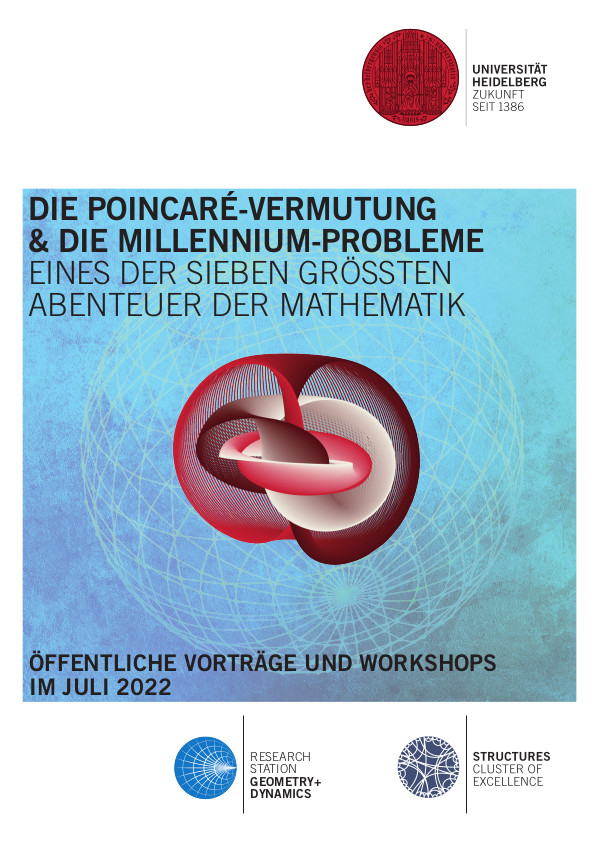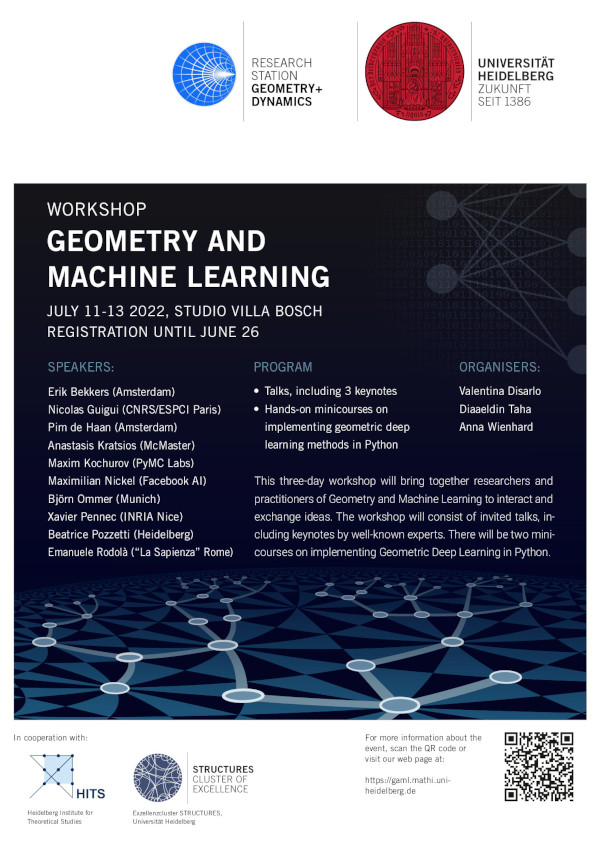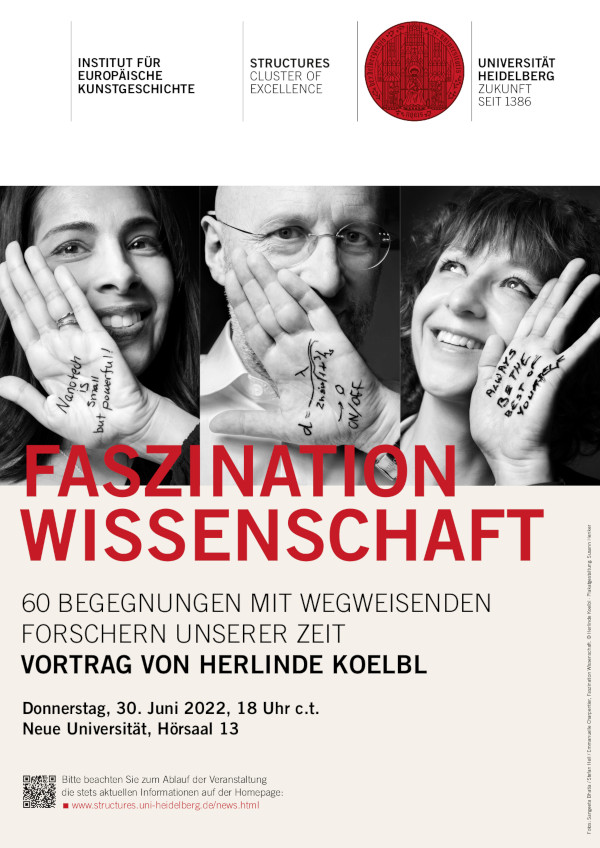Newsroom
Stay informed with our latest news and announcements on this page. For more in-depth content, we also encourage visitors to explore our bimonthly STRUCTURES Newsletter magazine, which features a variety of articles, interviews with members, and background information on our latest research and activities.
We are happy to invite all STRUCTURES members, their families and friends to the STRUCTURES summer party 2022 on July 15, from 5:00 pm. It will take place in the atrium of Mathematikon, INF 205. We would be happy if you join us for nice chats, finger food, and summer drinks.
The STRUCTURES Project Management Office is happy to answer questions.
In July, we proudly present two talks in Heidelberg on the Poincaré Conjecture, one of the seven famous, complex “Millennium Prize Problems” defined by the Clay Mathematics Institute in 2000. On July 15 and 22, respectively, Prof. Dr. Markus Banagl (Uni Heidelberg) and Prof. Dr. Sebastian Hensel (LMU Munich) will give insights into this intriguing subject and recent developments in the field. After the talk on July 22, there will be the opportunity to talk to the lecturer and other scientific experts and to participate in a hands-on exploration of geometry and topology at the Heidelberg Experimental Geometry Lab (HEGL). These events are part of a nationwide Millennium Prize Problems celebration. The solution to each of these problems carries a prize of 1 million USD. Among them, only the Poincaré conjecture has been fully resolved. Established by Henri Poincaré in 1904 and proved by Grigori Perelman in 2003, it states that every finite three-dimensional space without boundary, on whose surface every loop can be continuously contracted to a point, must have the form of a three-dimensional sphere.
Details on the programme can be found on the event page of the Research Station Geometry & Dynamics.
Please also see the associated press release (German).
Differential Geometry Seminar by Richard Kenyon: “Dimers, webs and SLn local systems” on July 7
We cordially invite you to attend the talk by visiting guest professor Richard Kenyon (Yale) in the Differential Geometry Seminar on July 7, 1:00 - 2:00 PM at the Mathematical Institute in Seminarraum A:
Title: Dimers, webs and SLn local systems
Abstract: We consider SLn-local systems on graphs on surfaces and show how the associated Kasteleyn matrix can be used to compute probabilities of various topological events involving the overlay of n independent dimer covers (or “n-webs”). This is joint work with Dan Douglas and Haolin Shi.
For more information, please visit the seminar web page.
On behalf of the Research Station: Geometry and Dynamics and the Cluster of Excellence: STRUCTURES, we are happy to announce that the registration for the “Workshop on Geometry and Machine Learning” (July 11–13, HITS) is open. This workshop will bring together researchers and practitioners of Geometry and Machine Learning to interact and exchange ideas.
You can register on: https://gaml.mathi.uni-heidelberg.de/
The deadline for registration is Sunday, June 26th, 2022.
An international group of astronomers under participation of STRUCTURES member Ralf Klessen found the imprint of the bubbles produced by the explosion of dying stars in the structure of the gas that pervades our galaxy.
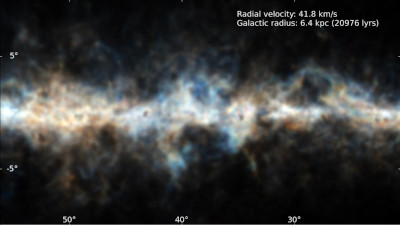
An international researcher team under participation of STRUCTURES scientists has found the imprint of bubbles produced by supernova explosions in the structure of the gas that pervades our Galaxy. They made this discovery by applying artificial intelligence (AI) methods to data from the HI4PI survey, the most detailed all-sky map of atomic hydrogen in the Galaxy to date. The scientists analysed filamentary structures in the emission of atomic hydrogen and found that their orientation with respect to the Galactic plane changes progressively with radius, indicating a similar distribution of atomic gas as in nearby spiral galaxies. The study revealed that filamentary structures preserved a record of dynamical processes induced by ancient supernova explosions and the rotation of the Galaxy. The new results are an important step in understanding the process responsible for galaxy-scale star formation.
Original Publication:
J. D. Soler et al., The Galactic dynamics revealed by the filamentary structure in atomic hydrogen emission, arXiv:2205.10426v1 [astro-ph.GA] 20 May 2022. See also the press release of the Center for Astronomy Heidelberg (ZAH).
We are happy to announce that the Young Researchers Convent (YRC) STRUCTURES Conference will take place from October 4th-7th 2022 in Heidelberg. The conference intends to bring together young and senior members of the cluster in virtue of closer collaboration. It serves as an opportunity to present and discuss research throughout STRUCTURES such as the CPs and EPs. The conference consists of seven keynotes by PIs in each of the CPs, as well as presentations of current projects from the members (talks and posters) of the YRC.
The registration will open soon, stay tuned!
Links: Conference webpage | YRC page.
New date: Herlinde Koelbl: “Faszination Wissenschaft - 60 Begegnungen mit wegweisenden Forschern unserer Zeit” on June 30
We are delighted to announce that the talk “Faszination Wissenschaft - 60 Begegnungen mit wegweisenden Forschern unserer Zeit” by photographic artist Herlinde Koelbl, which was postponed due to the pandemic situation, has a new date:
Thursday, June 30, 6 pm (c.t.),
Neue Universität, Hörsaal 13.
The talk will be held in German. The STRUCTURES Project Management Office is happy to answer questions.
